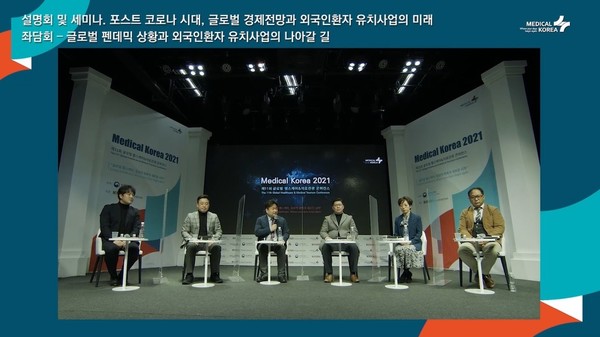Korea should relax quarantine directives for foreigners to attract more international patients and revive the medical tourism industry, hit hard by the Covid-19 pandemic, experts said.
Experts urged the government to come up with new strategies to attract foreign patients at Medical Korea 2021, a conference on global healthcare and medical tourism hosted by the Ministry of Health and Welfare and sponsored by the Korea Health Industry Development Institute (KHIDI).
Andy Hong, leader of the Global Healthcare (Inbound) Policy & Planning Team at KHIDI, called the years from 2021 to 2025 “Medical Korea 3.0 Era,” which includes all times with ongoing Covid-19 and post-Covid-19.

“The nation needs a new long-term strategy for attracting international patients, and each medical institution and agency should get ready,” he said.
Jin Do-yeoun, administrative director at the Korea University Anam Hospital’s International Healthcare Center, pointed out that quarantine directives and visa issues discouraged international patients from visiting Korea.
Jin said most foreign patients from Mongolia, Russia, and Kazakhstan are not financially well off, but the mandatory quarantine for two weeks at a hospital under the ‘fast track’ program costs over 12 million won ($10,592). The fast track program allows a severely ill foreign patient to receive medical treatment at a hospital on the condition that the patient stays in a single room.
“The fast track program is only for affluent patients,” she said. Jin called for easing quarantine directives for foreign patients who have already received a Covid-19 vaccine to increase visiting international patients.
Unless the government does so, Korea will remain at a status quo in medical tourism for foreigners, she added.
In response, Hong of KHIDI said the institute has not set any measures clearly for foreign patients entering Korea. “Last year, the fast track program allowed severely ill patients only. But this year, we plan to expand it to patients with mild symptoms,” he said.
Before the Covid-19 pandemic, international patients could visit Korea as long as they could afford minimum medical costs and expenses for their stay in Korea. However, after the pandemic, only severely ill patients who need urgent care or affluent patients could visit Korea, Hong added.
Kim Chang-sik, team manager of the International Healthcare Department at Sun Medical Center, said hospitals in provincial areas with a limited infrastructure rarely attract foreign patients through agents, unlike those in Seoul where agents are actively involved.
the government raises a bar in attracting foreign patients. In that case, international patients are likely to prefer hospitals in the Seoul metropolitan area and medical institutions in remote regions will lose opportunities to attract them, Kim noted. He urged the government to set conditions helpful to regional medical institutions to attract foreign patients.
Others cautioned against the government’s push to increase the number of visiting foreign patients, citing the ongoing pandemic.
Lee Hwang, CEO of Ascle InterMed, said medical institutions will find it difficult to attract foreign patients to make profits, while the Korean people are still concerned about imported Covid-19 cases. “There should be a public consensus on attracting foreign patients,” he said.
Another expert raised the need for using digital healthcare.
Jason Jeong, CEO of H & Consulting, said digital healthcare is the key for Medical Korea 3.0. However, the nation’s institutional and legal measures do not reflect digital healthcare much when it comes to encouraging international patients' visits, he said.
The Act on Supporting of Overseas Expansion of Medical Services and Attraction of International Patients, which took effect this year, is still based on the “positive” whitelisting system, while laws for the other industries are changing to the “negative” blacklisting system that open all possibilities except for several exceptions, Jeong noted.
“The government should offer various support measures and open opportunities for telemedicine,” he added.

